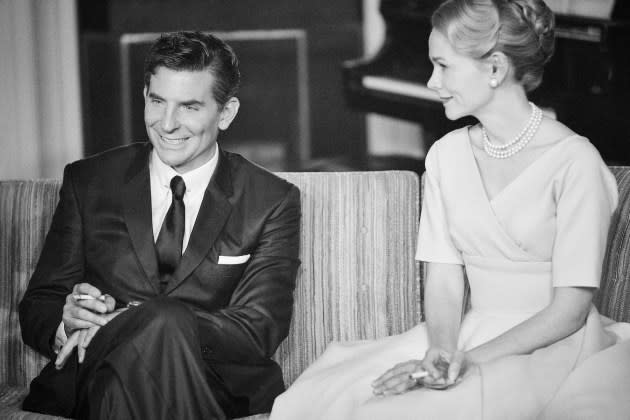Bradley Cooper’s ‘Maestro’ Is a Beautiful Tribute to Leonard Bernstein
- Oops!Something went wrong.Please try again later.
- Oops!Something went wrong.Please try again later.

Much ink has been spilled — or rather, tweets fired off — over Bradley Cooper’s prosthetic nose in his Leonard Bernstein biopic. Because Cooper is not a Jew himself, dissenters opined, accentuating his schnoz was an act of crude caricature. Of ethnic derision. The word “Jewface” trended online for an entire day, a development far more troubling and ignorant than a bit of movie makeup, suggesting that hordes of people believe Jews are a monolith possessed of defining facial attributes, and that said characteristics are aberrant. Never mind that the legendary composer’s three children publicly stated they are “perfectly fine” with the decision, championing their late father’s “nice, big nose” and lauding Cooper for including them “along every step of his amazing journey.” And never mind that these criticisms were gleaned from a handful of promotional materials and not the film itself. In short, this tempest in a teapot revealed far more about our current cultural anxieties, sensitivities, and suspicions than anything else.
And all the rank discourse is a shame because Maestro, Cooper’s Bernstein film, is made with such reverence and love for the man that after seeing the picture, which premiered at this year’s Venice Film Festival, there will be no doubt in your mind that this is not just a worthy tribute to one of the greatest figures in the American musical canon, but also one of the finest films of the year.
More from Rolling Stone
'Priscilla' Shows Elvis's Dark Side, and Is Sofia Coppola at Her Best
Robbie Williams Reflects on Success in Trailer for Upcoming Netflix Docuseries
From its earliest moments, you can tell that Cooper and Co. have prepared something special. The dialogue is rhythmic and fast, zipping and humming along like a classic screwball, and the black-and-white lensing, courtesy of ace cinematographer Matty Libatique, recalls Hollywood’s Golden Age. Silhouettes of Bernstein (Cooper) and his paramour, Felicia Montealegre (Carey Mulligan), melt into one another as they kiss in a caliginous theater — a shot that contrasts beautifully with one later on where her body is subsumed by his vast shadow.
As the story goes, Bernstein’s life changed when, at just 25 years of age, he received a telephone call notifying him that he would be filling in as conductor of the New York Philharmonic at Carnegie Hall that evening. This moment of elation is conveyed via god’s-eye view, in an unbroken take, as young Bernstein races from his bed to the venue’s balcony. In scenes like this, Libatique’s camera dances like violins in a concerto. (The two previously worked together on Cooper’s directorial debut, A Star Is Born.)
Shortly thereafter, Bernstein meets Felicia, a Chilean actress of Costa Rican-Jewish extraction, whose zest and witty repartee is a good match for his manic energy. Maestro is never more thrillingly alive than when Cooper and Mulligan are bouncing off one another. Whether flirting or flinging insults, it’s music to the ears. And, thanks to these two fiercely committed performances, theirs feels like a love that, for all its flaws, is achingly real. It does not take long for Felicia to learn that Bernstein prefers the company of men, and Mulligan expertly captures Felicia’s long-simmering resentment. When it boils over in a third-act confrontation, her delivery of the line, “If you’re not careful, you’re going to die a lonely, old queen,” cuts to the bone. Maestro is every bit Felicia’s story as it is Bernstein’s, and all the better for it. Through her, we see how convivial, how magnetic, how self-involved, how cold he could be.
And what of Cooper? Early on, Bernstein describes himself as “a composite” able to do and be many things at once, and the same applies to its star, who also co-wrote (along with Spotlight scribe Josh Singer), produced (with a couple of fellas by the names of Martin Scorsese and Steven Spielberg), and directed this opus. Heck, that’s even him playing the piano. Cooper is not only a chameleon, fully embodying Bernstein and his restless genius whilst never striking a false note, but a truly gifted filmmaker. A Star Is Born was no fluke, ladies and gentlemen. This guy is the real deal.

The best decision Cooper makes in Maestro, which will be released in theaters Nov. 22 prior to streaming on Netflix Dec. 20, is not hitting any of the big biopic beats that lesser films would really hammer home. Its framing device of an elderly Bernstein, shot in color, reminiscing to a documentary crew notwithstanding, there are no scenes of Bernstein, say, composing the score to West Side Story, or writing his opera Trouble in Tahiti during his and Felicia’s honeymoon in Mexico, or conducting his response to the JFK assassination, or of the infamous soiree in Tom Wolfe’s “Radical Chic” (thank god). It instead shows us Bernstein and Felicia’s union through a series of intimate moments — Cooper’s Scenes from a Marriage, if you will — while still articulating how talented of a musician Bernstein was in snapshots of him acting out a dance sequence in sailor garb from Wonderful Town, composing MASS at his Connecticut estate, teaching Tanglewood students, and conducting an orchestra with fire and fury.
In one revealing exchange, Bernstein confides in Felicia that as a child he would often fantasize about murdering his father for he was a “cruel” man, leading her to conclude that it was anger, not a love of people, that drove him to great heights. Whatever it was, we should be grateful that Lenny graced us with his presence, and that Cooper has crafted this warm-hearted work of art honoring him.
Best of Rolling Stone

